

























































I’m honoured to be back working with the amazing group of folks who make up the SaskCulture Board of Directors. These volunteers bring great knowledge and deep passion focused on ensuring that the people of this province continue to have access to the cultural activities that they appreciate and enjoy. I acknowledge and thank them for their enthusiasm and commitment. Returning in the role of Chair has reminded me of how much this organization has accomplished over the years, and how the community remains so committed to supporting cultural activity as a vital part of quality of life in this province.
After the SaskCulture board set a new direction for the organization in 2019, staff and volunteers accepted the challenge to ensure the organization and funding from Sask Lotteries Trust Fund for Sport, Culture and Recreation continues to meet the needs of Saskatchewan people. We realize there are barriers and gaps that need to be addressed. As with all SaskCulture planning, we want to ensure that funding, support and resources for culture and cultural activity continue to make a difference.
During this time, we have continued to see the impact of increased immigration, which has enhanced the wonderful diversity in our communities. We have been committed to supporting Truth and Reconciliation –paving the way for First Nations and Métis peoples to determine and lead their own cultural experiences going forward. We have recognized the impact of COVID-19 on the artists, artisans and cultural workers throughout the province, and continued to be flexible and adapt to support their successful re-emergence. And, we have continued to support the sharing and connecting of different cultures and cultural opportunities to support a healthier, more harmonious future.
SaskCulture is in the process of taking a good look at itself as an organization, its funding model and its associated programs. We want to hear from the cultural community, both long-time and new members, as well as those who have faced barriers to the programs we offer. We need to seek out members of equity- deserving groups – which includes First Nations and Métis peoples, people who identify as 2SLGBTQIA+, Black people and People of Colour, People with Disabilities, people living in northern Saskatchewan, and other remote areas –and work to increase inclusion, diversity, equity and accessibility for all.

There is a lot of work ahead of us. On behalf of the entire board, we are thankful to Dean Kush and his talented staff for taking on this challenge and working to ensure the funding model is sustainable, as well as supporting meaningful change to ensure SaskCulture continues to make a difference. This team is passionate about their work and is very committed to supporting a strong, thriving cultural community that can meet the needs of Saskatchewan for years to come.
The SaskCulture Board also wants to thank the many individuals, groups and organizations that support culture in this province. The past few years of pandemic life have not been easy, and have presented unprecedented change and challenges. Bravo to the talented, tireless and creative individuals that have worked through these past years to maintain, renew or reinvent cultural opportunities for Saskatchewan peoples. Your efforts are appreciated.
Thanks again to everyone for contributions this past year and for helping to build a culturally vibrant province.
Sincerely,
Another year has come to pass and along with it the opportunity to reflect on the work of SaskCulture and its dedicated volunteers and staff.
This past year had a more palpable element of stability compared to the two years preceding it. Pandemic restrictions were no longer looming. The cultural network, although bruised and battered, emerged with a renewed sense of confidence. We learned new ways of doing business and residents of our province emerged to once again engage in cultural activities. Of course, challenges related to inflation, volunteer engagement and audience development still were on our minds.
To help encourage people to get back to in-person cultural activities and events, SaskCulture, along with Creative Saskatchewan and SK Arts, launched the "Find the Fun” campaign that ran from May to October 2022. The campaign was designed to encourage residents of our province to re-engage in cultural activity. The campaign reached over 30% of Saskatchewan residents and had over 6 million impressions on social media. Culture Days set records for attendance this past year and we hope that this trend will also reach other cultural events and venues. In addition, we were pleased to see Creative Kids application levels return to pre-pandemic levels. We are so proud that, since 2010, we came very close to granting our “6 millionth dollar” this year. What a milestone!
We also made progress on increasing the reach of funding. Our partnership with SK Arts on the Indigenous Share and Connect program demonstrated innovative work with community partners utilizing a participatory grant-making model. Our work with Gabriel Dumont Institute on the Métis Cultural Development Fund saw record levels of uptake on the fund. We continue to work with the Northern District for Sport, Culture and Recreation on the Northern Cultural Youth Fund. Levels of funding for this program were increased again this year. Our Small Grant Accessibility Program saw a record number of grants enabling us to engage with new organizations. All of these programs provided the opportunity to share the story of Sask Lotteries and the value of lottery dollars to the people of Saskatchewan.
This past year, SaskCulture was also able to build the foundations of our Funding Program Renewal Project. We dug deep into leading funding practices related to inclusivity, diversity, equity and accessibility. We set the stage for a pilot on a new approach to evaluating cultural impact and learning more about what success looks like in the sector. And finally, we have developed an approach to what will be several years of consultation with our cultural network. We look forward to meeting with you and getting your valuable input.
Fortunately, lottery revenues continue to be robust and this translates to an enviable level of stability for cultural groups for years to come. We are so fortunate to have had the support of the Ministry of Parks, Culture and Sport, and our tri-global partners, Sask Sport and the Saskatchewan Parks and Recreation Association.
I am also very thankful to have the opportunity to work with our SaskCulture staff team. The passion they bring on a daily basis, combined with their knowledge and appreciation of the cultural ecosystem, always fills me with pride and confidence that we are doing our best. For SaskCulture, we have experienced a fair amount of change over the past year. Following the changes made to enable us to work through the pandemic, we have continued to keep up a high level of service and production while working in a hybrid workplace model.
In addition, we saw some folks leave and new faces added, including two employees working from Saskatoon and one from Indian Head. Our team’s capacity continues to grow, allowing us to engage even more with our members and the cultural community. Since it is volunteers who are the key drivers of this organization, I want to thank SaskCulture’s Board of Directors for their support, their vision and their ability to bring valuable perspectives to the board table. Taking on a volunteer role for an organization like ours is a task not to be taken lightly – I respect your dedication!
It’s been a great year; one filled with positive movement forward. Our thanks go out the many cultural leaders who have faced pandemic challenges valiantly, kept things moving and growing and continued to build a culturally vibrant Saskatchewan!
Dean Kush, CEO

SaskCulture strives to build a culturally vibrant future in which all people in Saskatchewan, individually and collectively, celebrate, value and support participation in, and access to, cultural experience.
SaskCulture unites the cultural community and works to advance the cultural vibrancy of the province.
SaskCulture supports engagement in cultural experience.
Cultural activity / Experiences / Engagement / Revitalization.
SaskCulture recognizes strength in common purpose.
Cohesiveness / Collective effort / Advocacy / Cooperation / Partnership / Volunteerism / Cultural work / Treaty peoples.
SaskCulture provides equitable and fair access to resources.
Sask Lotteries / Transparency / Accountability / Effectiveness / Delivery / Cultural impact / Accessibility / Unique service.
SaskCulture will be responsive to people within Sask.
SaskCulture works to build a culturally vibrant Saskatchewan, where…

People of Saskatchewan actively value, support and participate in culture; and
Diversity / Accessibility / Inclusivity / Equity / Democratic process / Multiculturalism / Reconciliation.
The cultural eco-system in Saskatchewan is accessible, inclusive and sustainable.
SaskCulture’s project grants provide over a million dollars annually to help increase inclusion, diversity, equity and/or accessibility in the province. In 2022-23, applications to these programs returned to pre-pandemic levels and engaged many new applicants. Increased success rates for applicants demonstrate how the programs continue to open doors to the diversity of people and activities available.
70% increase in applications submitted since 2021/22
81% success rate for applicants: 138 successful applicants
for 2022-23 supported a wide range of cultures: $1,098,103
56.1% increase in project funds distributed
170 applications submitted in 2022/23 as compared 100 2021/22
32% of successful applicants were new to SaskCulture: 44/170 new applicants
83% increase in new applicants from year before
29% Métis
21% Ethnocultural 6% CrossCultural
42% First Nations
2% Other
For the past four years, many cultural organizations have taken the opportunity to assess their operations against the NonProfit LifeCycles model. This past year, SaskCulture linked eight new organizations, large and small, with LifeCycles consultants to help ensure they were able to adapt and move forward successfully.
In 2022, SaskCulture’s Nonprofit Lifecycles Capacity Building Program focused on self-assessment and the strategic planning needed to ensure sustainable long-term programming and services. This kind of strategic planning is often out of reach financially for smaller organizations.
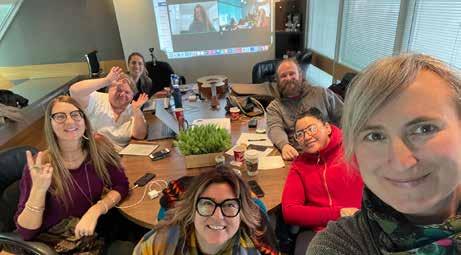
By giving an organization the support to make a strategic plan, the Capacity Building Program "has definitely built CAMP Sask Arts a stronger foundation,”
says Eliza Doyle, co-founder, president and executive director, Community Arts Mentorship Program (CAMP) Sask Arts. “This is so helpful for the longevity of the non-profit. Now we know where we're going, and we know the roles and the people that we need to keep the work going. It's been invaluable.”
Doyle, along with other board members, completed a selfassessment at the virtual workshop and hired a Lifecycle Consultant with funding support from the program.
Dennis Garreck, outreach consultant, SaskCulture, says that, "each round of the Nonprofit Lifecycles Capacity Building Program is different, depending on past results and the priorities that come up during the process." This year, the focus was on self-assessment and strategic planning, to respond to the need for long-term planning that is tailored to the specific needs of each non-profit.
“The Lifecycles framework helps you think about the right practice for where an organization is, as opposed to best practices for non-profits in general — because often what is good for a big organization may not be the best fit for a smaller non-profit,” Garreck says.
“The full self-assessment helps them to identify things. And then when they get into strategic planning, they can decide which priorities they will work on.”
Doyle says that when she started CAMP Sask Arts in 2020 in response to the need of arts programming in remote and underserved communities, she was unprepared for the nuts and bolts of managing a rapidly growing non-profit. Doyle says that building a strategic plan with a Lifecycles Consultant has helped the group “think about things in terms of longevity, as opposed to just the next thing,” to identify what they need to fulfill their mission to support communities through artist residencies and full-time arts teachers over the long run.
“That's what the non-profit is working towards: we don't do one-offs, and we don't leave a community before local capacity is built.”
programs and services, as well as throughout the province’s cultural eco-system. It involves research, evaluation, analysis, and a lot of listening and learning to come up with recommendations that will support the community going forward.
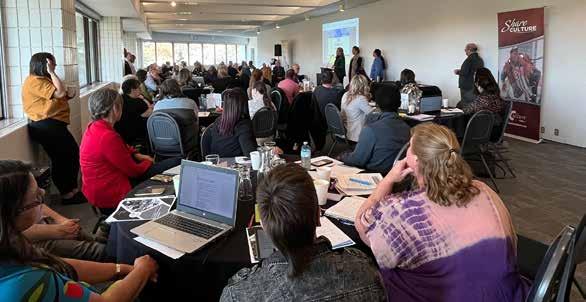
“Based on its strategic directions developed in 2019, the SaskCulture Board wanted to ensure that the funding model was sustainable and adaptive to meet changing needs. More specifically, it would support relevant cultural programming and Saskatchewan’s ever-growing diversity,” explains Dean Kush, CEO, SaskCulture. “Changes over the years, including demographics and Constitutional changes that affirmed the organization’s commitment to Truth and Reconciliation, have highlighted the need to improve reach, access and involvement of currently underserved, equity-deserving peoples.”
Other than small changes to direction and delivery, SaskCulture’s funding model has not changed since the last funding review in 2008. Since then, the needs of communities have changed, including an increased priority to ensure that funds better support inclusion, diversity, equity and accessibility (IDEA).
With this in mind, SaskCulture has made a good start on its long-term review and renewal process referred to as the Funding Program Renewal Project. Along with ensuring the effectiveness and sustainability of SaskCulture’s funding delivery systems, this project seeks to advance and support Inclusion, Diversity, Equity and Access (IDEA), in SaskCulture’s own
“It’s time for us all to commit to change that helps ensure that many equity-deserving groups are included and have access to quality cultural activity and experiences in the province,” says Kush. “We will evaluate what is happening right now, what these groups would like to see, and how we can adjust funding to ensure that all people have opportunities to participate.” Equity-deserving groups identified in this process include First Nations and Métis peoples, Black people and People of Colour (BPOC), persons new to Canada, 2SLGBTQIA+ peoples, persons with disabilities, and people living in remote areas, such as northern Saskatchewan.
Determining how millions of dollars from Sask Lotteries proceeds will support arts, heritage and cultural activities and experiences around the province is no easy task. It involves listening, learning and being adaptable to the needs of Saskatchewan people.
PHASE ONE
2021–2023
RESEARCH & EVALUATE
• Planning/Terms of Reference
• Develop Evaluation Model
• Creative Kids Review
• Demographics study
PHASE TWO
2023–2024
CONSULT
• Planning
• Consultations/Grant Pilots
• Establish Partnerships
• Outcome Report
The Funding Program Renewal Project will go through three phases, which includes: Phase 1 research and evaluation, Phase 2 consultation, and Phase 3 analysis and recommendations. Over the past year, Phase 1 of the Project included a research and literature review, completed by Praxis Consulting, which provided a better understanding on leading practices in equity funding in other parts of Canada and beyond, as well as getting a better understanding of inclusive language. A summary of Leading Equity Practices, gathered in this review, is available on SaskCulture’s website.
Work also began on an Evaluation Framework that will establish a values-based approach for measuring progress towards advancing and supporting inclusion, diversity, equity and accessibility in SaskCulture’s funding programs, as well as guiding decision-making. Kush notes that this work, “will help us all gain a better understanding of how cultural communities can become more inclusive, equitable and accessible and how the work of SaskCulture and the cultural network can support a greater diversity of people.” Different pilot projects will introduce new evaluation models, tools and training, which will be designed to help the cultural community as a whole.
“By mid-2023, the community can expect to hear more about a consultation process where they can provide their ideas on how funding needs have changed and future distribution options.”
Along with connecting to the many existing stakeholders throughout the cultural network, consultation will be a
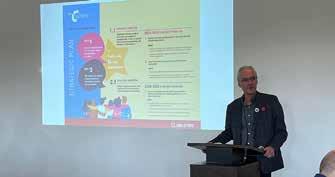
PHASE THREE
2024–2025
ANALYZE & MAKE RECOMMENDATIONS
• Analyze Research/ Consultations
• Key Recommendations/ Review
• Implementation Plan
NEXT STEPS
2025–
IMPLEMENT CHANGES & EVALUATE
• Implement Changes
• Get feedback
• Support ongoing evaluation
great opportunity to form new and diverse partnerships with equity-deserving groups. “We look forward to connecting with everyone, including others who are not normally included, to learn more about how we can better serve Saskatchewan,” says Kush.
“The funding program renewal process includes extensive research, assessment, consultation with stakeholders and a lot of thought – it is not something that will be completed quickly,” he adds. The renewal process includes a review of all funding programs including Annual Global Funding and Creative Kids.
The community can look forward to a number of recommendations for cultural funding coming out of this Project that will help meet the needs of Saskatchewan residents into the future.
Dean Kush, CEO, SaskCulture, presents on the organization’s Strategic Plan and work on key areas, such as Funding Program Renewal, going forward.
Afterthree years of a pandemic, residents needed a reminder that it was time to get back to the arts, culture and heritage activities they enjoy. A provincial promotional campaign, which ran from May-October 2022, was designed to grab people’s attention to “Find the Fun” by returning to in-person cultural experiences in their communities.
It is no secret that the pandemic slowed in-person arts, heritage and cultural programming to a standstill, causing the postponement and cancellation of hundreds of festivals, theatre performances, lessons and more. Many artists and cultural leaders trying to make a living through these pursuits were forced to go on pause, or work online. When restrictions were finally lifted, artists and cultural organizations expressed concern about getting people back to in-person activities and events.
SaskCulture, along with its partners SK Arts, Creative Saskatchewan and the Ministry of Parks, Culture and Sport, recognized the importance of reminding residents that artists and cultural workers needed their support. They came together to develop the #FindtheFunSK campaign to support the sector as it bounced back from the impact of COVID.
“Find the Fun was designed as a reminder to Saskatchewan residents, that the activities, such as live music, theatre and art exhibits, were once again open and welcoming everyone back,” says Dean Kush, CEO, SaskCulture. “People had changed over the course of COVID, and changed their routines. The campaign was an opportunity to remind them of the wealth of arts, heritage and cultural experiences they were missing.”

Besides social media posts and signage at bus stops and in bathroom stalls around the province, the #FindtheFunSK campaign directed people, through a QR Code, to cultural events around the province through Tourism Saskatchewan and the online Cultural Events Calendar at saskculture.ca/events.
During the campaign, the online Cultural Events Calendar averaged 200 or more event searches a month, between July and October, 2022. Influencers, such as Drag Artist Chelazon Leroux and Peace Akintade, a Saskatoon poet, shared the Find the Fun SK messages with their TikTok accounts reaching close to a million views combined. The Find the Fun SK website had over 7,200 visits. In total, the campaign had over 6.5 million social impressions, reaching an estimated 32% of Saskatchewan residents.
While some cultural groups are still struggling to bring audiences and participants back to re-engage and recruit volunteers, focused efforts continue to encourage participation and engagement throughout the year.
 Drag Artist Chelazon LeRoux shared the Find the Fun message with over 500K TikTok followers.
Drag Artist Chelazon LeRoux shared the Find the Fun message with over 500K TikTok followers.
Notall organizations are incorporated or have the capacity to apply for big grants. In order to kick-start dialogue among representatives of the Black community in Regina, the PRIMORG Foundation, a newly formed cultural group, turned to SaskCulture’s new, flexible grant program for support.

SaskCulture created the Small Grant Accessibility Program (SGAP) to provide new and emerging cultural groups with great program ideas, such as PRIMORG Foundation, with an easy, less restrictive funding source. The SGAP aims to provide support to new and innovative cultural initiatives by creating access for first-time or underserved applicants.
“We were happy when we discovered we could receive support through SaskCulture. The funding made the event possible,” says Augustine Okhiria, executive director, PRIMORG Foundation. “The participants were excited to contribute their knowledge and experiences during the dialogue. And, there was an increased understanding by participants of how racism affects the Black community.”
Formed in 2021, the PRIMORG Foundation promotes peaceful co-existence between and amongst Canadians by hosting events and creating initiatives that create awareness about racism and racial tension.
Wanting to host its first event to increase awareness of its efforts and encourage conversation, the organization received funding support to make this a reality. The Speaker Series event, “Mobilizing Regina's Black Community to Promote Peaceful Coexistence,” brought together representatives from the Black community in the province, along with legislators, government, and stakeholders to discuss the challenges the Black community faces and the need to promote a deeper understanding within and outside the community.
“We got new ideas from participants on increasing the Black community's quantitative participation and improving on building relationships in the province,” Okhiria says. “The participants were happy to work together and collaborate to promote greater understanding and harmony across different communities in the province.”
He adds that, PRIMORG has laid the foundation for future engagements with other communities thanks to this first event. “We are following up on all the ideas that were brought up at the event. That plan is in the works for another Speaker Series event.”
Since its launch in 2021, SGAP has supported over 30 initiatives with long-lasting impacts on culture and cultural activity in the province.
PRIMORG was able to hold their first event thanks to funding from SGAP.PRIORITY
FUNDING IS SUSTAINABLE AND ADAPTABLE TO CHANGING NEEDS
Moreand more good causes emerged post-pandemic, increasing the challenge for charities to raise awareness and funds to support kids who can’t afford cultural program costs. Thanks to new partnerships, new promotions and an extremely successful fundraising event, Creative Kids found a way and was able to help over 1,200 kids access cultural programs this past year.
In 2022, applications to Creative Kids continued to increase, reaching to just below pre-COVID levels. Of the 1,468 applications submitted, 1,231 kids, from 83 communities throughout the province, were supported in pursing their creative passions. As a result of helping these kids, more than 240 instructors of music, dance, theatre, visual art and/or cultural heritage, were paid for their services.
“In challenging times, fundraisers have to be even more creative,” says Gloria Walsh, administration manager, SaskCulture and Creative Kids. “In 2022, we continued a focused-approach on foundations and grants, major donors, third-party fundraising, as well as getting out into the community to talk about the program directly with potential donors.”
A successful partnership with Cultural Connections Regina, which runs the India Night Fundraiser, was an important contributor to funds raised over the past year. “The India Night Fundraiser raised over $160,000 for Creative Kids,” says Walsh, “and we are enormously grateful.”
251 Saskatchewan Communities Supported
12,890 Applications funded
$5.97 Million granted
5,589 Facebook followers
Donors recognize that the need continues to grow. “People are hearing more about how arts and cultural activities are life-changing and develop many positive attributes in children and youth,” says Walsh. “These
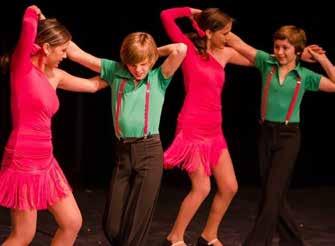

messages are being shared throughout regular media channels, as young people share stories of change and success in life.” Creative Kids has also increased its use of social media to reach new audiences with these messages.
Realizing that applicants were interested in returning to cultural activities, Creative Kids aimed to be as flexible as possible. According to Shawn Bauche, program consultant, Creative Kids, says “Although there was a renewed energy felt by families wanting their children to return to lessons or try new classes, some parents were still hesitant. To help, we kept the application deadline flexible to help more kids this year.” This flexibility gave applicants the time to find programs that met their needs.
Since starting in 2010, Creative Kids continues to see the demand grow. Except for the slowdown caused by the pandemic, the increase in applications, coincides with the increased awareness of the program. This past year, 237 kids out of 1,466 were denied funding. Bauche says, “No one likes to turn down any eligible kids, so work continues to encourage donations and increase the funds available. Program costs should not be a barrier to getting kids involved with a cultural or creative activity of their choice.”
N’Tanis and Kori Wuttunee credit their success to the support they received from Creative Kids to take Salsa lessons. Photo credit: Saskatoon Salsa Dance Company.IMPROVE INCLUSIVENESS, DIVERSITY, EQUITY AND ACCESSIBILITY
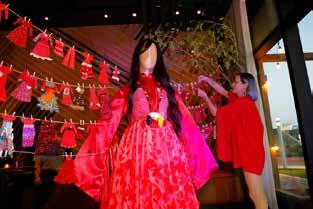
Over10,000 people from across Saskatchewan took the opportunity to learn more about Truth and Reconciliation, as part of 2022 Culture Days activities held on September 30, the National Day for Truth and Reconciliation (NDTR).
Since 2010, Culture Days, a Canada-wide celebration of arts and culture, has enabled SaskCulture to promote the wide diversity of cultural activity in the province, in a large awareness campaign each year. In 2022, Culture Days in Saskatchewan took place September 23-October 16, offering well over 41,200 participants the opportunity to engage in over 259 free, interactive cultural activities hosted by over 27 local arts and cultural groups in communities throughout the province. With the inclusion of both in-person and virtual activities, participation tops over 100,000 participants in Saskatchewan according to national statistics.
"Culture Days is a national cultural celebration, so shining the spotlight exclusively on Truth and Reconciliation-focused events gives people throughout the country an accessible and meaningful opportunity to learn about and better understand the many impacts of residential schools," says Shelley
Fayant, outreach consultant, SaskCulture. Fayant served on the Culture Days National Organizing Committee for the past seven years.
SaskCulture has offered the Culture Days Hub Sponsorship for the past three years to help communities support Culture Days activities. In order to encourage more Truth and Reconciliation activities, the criteria for the Hub Sponsorship was modified in 2022. Many communities, including Prince Albert, Melfort, Porcupine Plains and Oxbow, jumped on the opportunity to include Truth and Reconciliation in their Culture Days celebrations.
City of Prince Albert
Melfort and District Museum
City of Yorkton
City of Swift Current Nutrien Wonderhub (Saskatoon)
Town of Porcupine Plain
Oxbow & District Recreation Board
Art Gallery of Regina
Last Mountain Lake Cultural Centre
Nuit Blanche (Saskatoon)
The Reading Place (Battleford)
Town of Mossbank
Iyinisiwin Story Institute (Saskatoon)
Saskatchewan River Valley Museum (Hague)
Saskatchewan Craft Council (Saskatoon)
City of Lloydminster
Eastend Arts Council
Town of Lumsden
City of Weyburn
Yellow Quill First Nation (Kelvington)
Muskeg Lake Cree Nation (Saskatoon)
Grand Coteau Heritage & Cultural Centre (Shaunavon)
Town of Shellbrook
City of Warman
While the Hub Sponsorship continued to offer organizers support for a wide range of Culture Days activities, Fayant says, the new focus helped some communities take the first step toward Truth and Reconciliation. "SaskCulture prioritized applications with a NDTR focus to help engage communities in Truth and Reconciliation while offering guidance to ensure events were respectful, meaningful and involved First Nations and Métis people in the planning to center their voices and experiences in the day’s activities.”
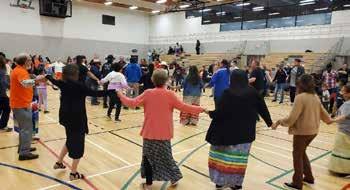
24
24 Hubs were sponsored. Over 100,000 participated (digitally and in person)
9% 10K+ Over 10,000 people attended events on September 30th. Approximately 259 activities were offered in person, online and outdoors.
259
41,200 Attended in-person
Treena Mohrbutter, community development officer, Town of Oxbow, was eager for her community to learn more about Truth and Reconciliation. She says, the town’s Reconciliation Reflection Walk event was a huge success thanks to the guidance and involvement of Elder Angie McArthur-Delorme, from White Bear First Nations. Thanks to the Hub Sponsorship, Mohrbutter took the opportunity to reach out and partner with the First Nations community nearby. She was able to learn more about meaningful Truth and Reconciliation activities. “Elder Angie was just so awesome and kind. She told me you can’t reconcile until you know what you’re reconciling. We begin to do that by building bridges and relationships and understanding each other, explains Mohrbutter. "We shared our intentions and objectives and then got to work putting things into motion.”
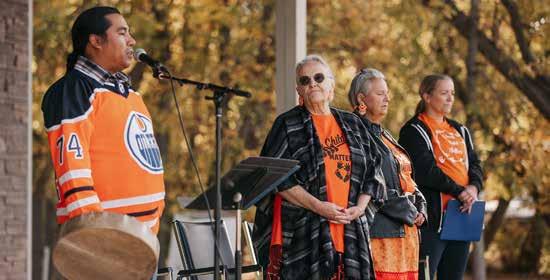 As part of their Culture Days celebrations, Muskeg Lake First Nation held a Welcome Back Round Dance.
As part of their Culture Days celebrations, Muskeg Lake First Nation held a Welcome Back Round Dance.
By connecting with others from different cultures, a new program is widening the discussion on racism, oppression and colonialism in order to build understanding and change attitudes.
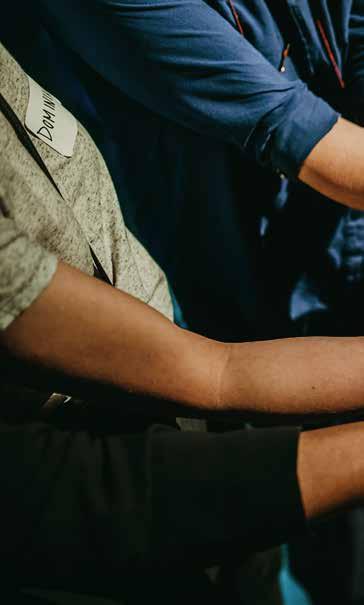
The Multicultural Council of Saskatchewan (MCOS) launched the Intercultural Connections and Antiracism Engagement (ICARE) project this past year to bridge the gaps in conversations among the many groups and individuals working to eliminate racism and oppression. It includes discussing and implementing ways to change colonial thinking.

Risa Naytowhow, ICARE coordinator, MCOS, says, “It’s important to have these conversations, as they also enrich diversity, build relationships in our communities and bring those communities together instead of having separate conversations.” She says that bringing together Indigenous peoples, newcomers, established immigrants, settler organizations and other community members creates an “intersectional” and “decolonial” approach.
This is also where people from different cultures and backgrounds can share common experiences, she says, “Intersectionality builds a bridge where people can discuss common experiences of oppression.” For example, women across all cultures have experienced certain stereotypes, such as being called bossy when they are being assertive.
Since beginning in January, Naytowhow has coordinated several different initiatives. She set up a virtual monthly book club, highlighting books from different cultures each month, focused on the theme of anti-racism and decolonization.
Increasing awareness of equity and inclusion
She also facilitated workshops as part of Behind the Racism: Challenging the Way We Think, an exhibition held at the Saskatchewan Science Centre in March. The workshop discussions explore why some groups report hate incidents and others don’t, assumptions and the impact of other people’s assumptions.
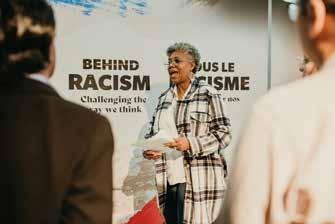
Along with setting up two new advisory committees, she hired facilitators from LaRonge, Prince Albert and Regina as part of the ICARE project to help her work within their communities to identify partnership opportunities for intracultural and anti-racism activities.
All of the initiatives so far aim to eliminate discrimination, racism and prejudice, by building relationships and giving people a voice to have those hard conversations in a respectful way. Naytowhow says, when people feel they can talk about what they have experienced and why those experiences happened, it deepens understanding of racism and impacts of colonialism.
MCoS, which receives funding from Sask Lotteries Trust Fund, is committed to ICARE and carrying on these discussions. The ICARE project is funded through the Community Support, Multiculturalism, and Anti-Racism Initiatives Program, offered nationally through Canadian Heritage.
Naytowhow explains that, “It's good to have these conversations to promote equity and diversity and to dismantle the colonial systems. It can be difficult work, but it creates critical thinkers and better environments.”

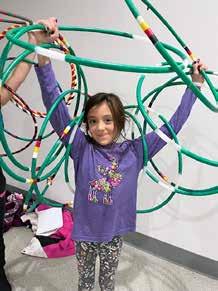
The Hoop Troupe classes for beginner and intermediate learners are based around the medicine wheel and the Seven Sacred Teachings of Love, Courage, Wisdom, Truth, Honesty, Humility, and Respect. “These teachings tell us that it is the children who will bring forward the sacred teachings and I see that every day in the work that I do,” she says.
Blouin has seen children come into the class with their heads down and eyes to the ground. “Self-esteem is a big component in my teachings,” she says. “I am committed to seeing children leave the classes with their heads held high.” She adds that, she encourages students to leave their impact on the world.
Blouin, who also goes by the name Grandmother Willow, knew that her journey of learning her Métis roots was one that had to be shared with younger generations. Since her grandmother had attended residential school as a child, Blouin developed a strong commitment to sharing teachings on Truth and Reconciliation.
“Learning and sharing about culture is part of the appreciation and respect,” she says. With lineage to the Cumberland House region in Treaty 5 Territory, Blouin’s children began asking questions surrounding their heritage. Although much of her culture was kept quiet from previous generations, Blouin did recall some medicine teachings and stories from the trapline that helped her to dive deeper into her history.
During her learning journey, Blouin says, she was “called to the drum.” Blouin felt that the hoop dance was a great tool for sharing cultural history. When a close friend retired from teaching hoop dance classes, she took over, teaching the Hoop Troupe classes for years in her surrounding community. She just recently wrapped up a seven-month course in Creighton, SK with Creighton Recreation, Culture, and Tourism. This course received funding from the Northern Youth Cultural Fund, administered through the Northern District for Sport, Culture and Recreation, in partnership with SaskCulture.
Through her classes, she teaches students that the hoops are a reflection of themselves that tell their own personal story. She encourages learners to decorate their own hoops to reflect who they are as a person. Adding this personal element has also encouraged students to find their confidence and build their individuality.
Creighton’s Recreation Director Lindsay Shirran, says, “Kelleen is an exceptional leader who excels in guiding the Hoop Troupe. The children are all very proud of learning new skills through dance and their pride radiates through their smiling faces.”
“I owe everything to my grandmother, who encouraged me to follow my heart in these teachings,” Blouin shares. She has high hopes that her work bridges cultural connection and understanding, as her students are Indigenous and non-Indigenous. She feels it is important for everyone to learn these teachings, because Indigenous culture is all around us.
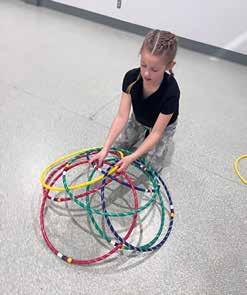
ThePajama Party Politics event series started as a space for open conversations about accessibility of the arts in the province from a disability cultural lens. Discussions and learning led to work on a “living document” about accessibility, particularly in arts and cultural activity, in Saskatchewan.
The project, organized in partnership by Listen To Dis’ (LTD) and the Saskatchewan Arts Alliance (SAA), started with the first Pajama Party Politics event in May 2022, which centred on the current climate of disability in the arts and the universal need for access.
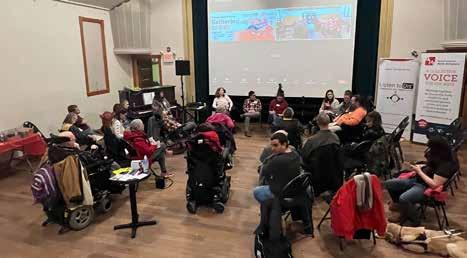
After receiving positive feedback from the community, LTD and SAA discussed the lack of resources on accessibility, with a local focus in Saskatchewan, and took the next steps to create a sharable resource.
"There's definitely a need for this sort of resource. It's something that's never been done here yet, and I think that there is a real appetite for it,” Em Ironstar, executive director, SAA, says. “There's so much interest in how the arts community can become more accessible.”
Traci Foster, artistic director and founder, LTD, says that, the final document will be an easily digestible resource that centres the perspectives of people with lived experience of disability, which will provide access guidelines, and “help readers understand the way disabled community members experience the arts and cultural sector.”
She notes that, “The standard way of understanding access is led by non-disabled people and professionals who lack lived experience of disability. We would like to continue to challenge and change this paradigm and systemic problem,” Foster said. “We hope that it will tenderly guide and hold people accountable for what they are doing to create actionable difference for the disabled community in the arts.”
Foster says that the document will also help lighten the load for Listen To Dis’ team, who field daily requests from organizations and individuals interested in understanding or creating access to the disabled community. The overwhelming demand for their services includes frequent requests for unpaid work.
So far, the discussions that have taken place during the Pajama Party Politics events have helped the team consult with the community, learn about their experiences in the arts and culture sector, and spread the word about the upcoming resource document.
Oneof the key strengths of the Share and Connect grant program, launched January 2023 by SK Arts, in partnership with SaskCulture, is its development through a participatory grant-making process. It is a process that SaskCulture hopes can be used to develop funding programs that meaningfully address Truth and Reconciliation, as well as inclusion, diversity, equity and accessibility going forward.
Participatory grant-making is a process that involves placing affected communities directly at the centre of grant-making, sharing the power of decision-making to decide who, what and how to fund. It has the ability to transform traditional grant-making practices and shift decision-making power to communities who are directly impacted.
“Participatory grant-making provides a platform to engage directly with affected communities,” says Damon Badger Heit, supervisor, Partnerships and Inclusion, SaskCulture. “It reduces barriers and builds cultural supports and programs that meet the needs
of the growing diversity of Saskatchewan cultures and peoples.” Badger Heit worked directly with SK Arts to develop the Share and Connect grant, which receives funding from the Sask Lotteries Trust Fund.
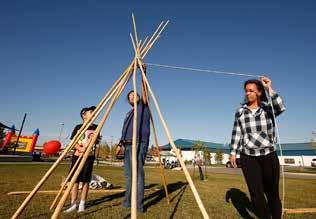
Carol Greyeyes, program consultant, SK Arts, explains how the participatory grant-making process began with ten virtual talking circles that brought together First Nations Elders, Residential School Survivors, artists and Knowledge Keepers to inform the development of the Share and Connect grant. Greyeyes says, it is a great model to disrupt colonial systems, and very necessary to be inclusive and responsive. “If we just keep doing everything the same way, we’re reinforcing those old structures, those old paradigms and the old way of doing things that were set up to be exclusive. Funding organizations are in a time of rapid societal change and we need to respond to those changes and adapt.”
Based on an Indigenous world view, the grant program offers an application and reporting process that is more simplified and accessible. People are able to apply and/or report orally by video-recording, videocall or phone call. Grant application assessment is guided by the Four R’s of Indigenous teachings of Respect, Responsibility, Relationship and Reciprocity. The process also dismantles the decision-making hierarchy between the granter and the community, replacing it with a more circular process, where everyone’s perspective is heard and valued.
Since launching the Share and Connect program, Greyeyes learned the consultations were also an effective communication tool. “We increased our advocates – people who could carry the knowledge of the grant back to their communities and spread the word.” As a result, the first funding round saw 18 applications, which were not only diverse in artistic medium, but high in project quality.
Increasing inclusion, equity, diversity, accessibility and more effective responses to Truth and ReconciliationThe Share and Connect grant was created by inviting community members into a participatory grant-making process to create a grant that would meet their needs.
For Clare McNab preserving the history of the Métis people from Southwest Saskatchewan is a priority. This past year, she coordinated an innovative podcast project to show how Métis values and lifestyles of the past are still present today.
The Living Culture Podcast Project, organized through the Prairie Dog Métis Local 123, recorded and broadcasted a series of podcasts in January 2023, featuring interviews with local Métis peoples sharing their stories and perspectives on Métis beliefs and traditions. The Project saw 15 Métis descendants from the Lac Pelletier area interviewed and produced into podcasts. Two gatherings also took place in the area, reconnecting descendants and their families.
“There's been a few books written, but really there's been very little documented about the history of the Métis people in southwest Saskatchewan,” says McNab, executive assistant to the President, Prairie Dog Local 123. “I wanted to show who Métis people are.” To help support these efforts, she accessed funding from the Métis Cultural Development Fund, administered through Gabriel Dumont Institute, thanks to funding from the Sask Lotteries Trust Fund.
From their current locations to chosen professions and life experiences, the diversity of Métis peoples from this area is showcased throughout the interviews. According to McNab, a number of the interviewees talked about their journey to finding more information about their family histories. All spoke about their pride in being Métis and the practices they are passing along to their children and grandchildren, she noted.
The focus of the podcast is on the positive elements of the Métis culture as opposed to intergenerational trauma. “Instead of talking about what isn’t working for us,” she says. “I wanted to focus on what is really working in the Métis culture, how times have changed and how people are doing today.”
One of the successes of the podcast, she says, is how the podcasts help to break down stereotypes of Métis peoples, showing their diversity. The storytelling also shares how so many of the interviewees have achieved personal and professional success.
Since launching the podcast, over 500 people have listened to the interviews. McNab hopes to apply for more funding to interview even more descendants from the area.
McNab says she enjoyed being a part of the project and learned a lot from the descendants, including the resilience of Métis peoples.
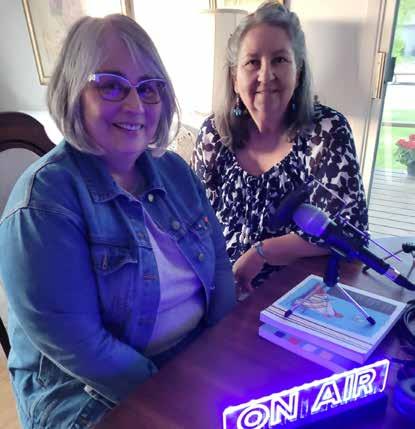
Aspart of its Truth and Reconciliation journey, the Moose Jaw Museum and Art Gallery (MJM&AG) embarked on a project designed to assess historic collections, share knowledge and ensure that Indigenous voices would lead the discussion and the repatriation process needed.
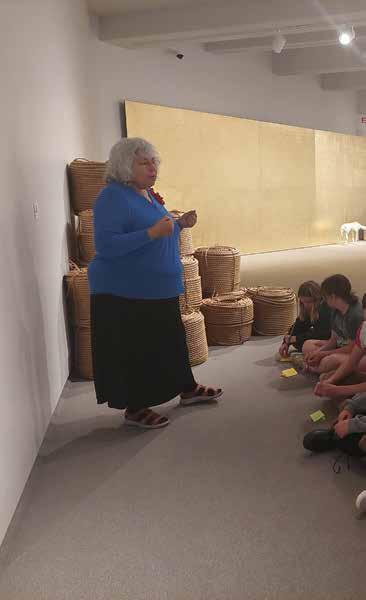
Over the past year, the MJM&AG has been working to address the Truth and Reconciliation Commission’s (TRC) Call to Action #67. According to Jennifer McRorie, curatorial director, MJM&AG, as part of this Call to Action, museums across Canada are called upon to decolonize traditionally colonized institutions, to ensure that Indigenous voices lead, inform and are central in establishing policies, procedures and context.
As the temporary home to an extensive collection of Indigenous objects, including a large collection of historic beadwork specific to the region, the MJM&AG wanted to work with First Nations and Métis leaders to determine the collection's future. Its new project, Connecting Indigenous Living Objects with Their Communities, invited Indigenous direction on the MJM&AG’s programming of Indigenous content and collections.
“This project is engaging Indigenous traditional knowledge keepers and Indigenous community leaders, researchers, artists and educators to collect oral histories of the Indigenous living objects within our permanent collection and link them with their originating communities and families, if possible,” McRorie explains. The project was conceived and directed through MJM&AG’s Indigenous Advisory Committee (IAC).
The Indigenous Advisory Committee also identified the important role of Indigenous women and matriarchs in this work. “[The committee] acknowledged the importance of Indigenous women in taking on leadership roles in this regard,“ says McRorie, “since they have been primarily the makers of many of the cultural objects in our collection and possess much of the oral traditions and cultural knowledge.”
Additionally, the MJM&AG wants to transfer and share traditional knowledge around the collection with children and others to build the understanding of Indigenous histories and traditions unique to the area.
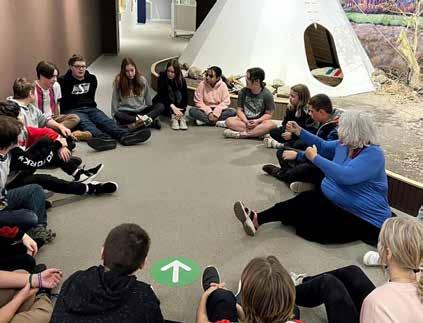
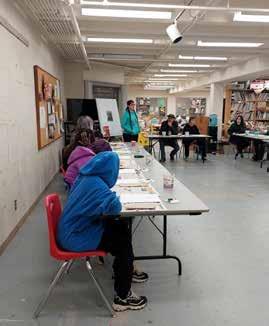
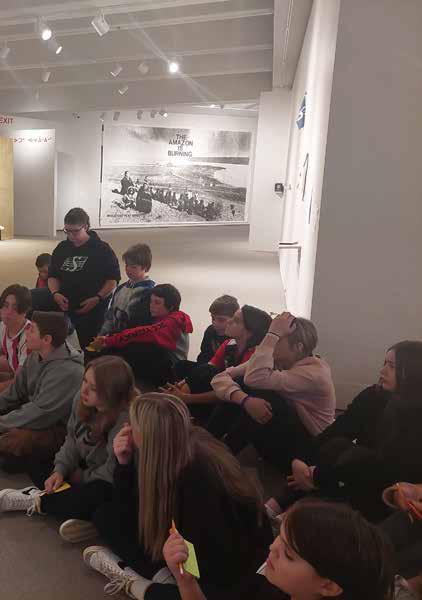
Knowledge Holder, Barb Frazer and founding member, IAC, says, MJM&AG has created a safe, healing, and celebratory cultural space for the community. “[It is an] ancestral responsibility to be care-takers, and this extends to the cultural and respectful handling of the ancestor's hand-tooled objects housed within the Moose Jaw Museum and Art Gallery,” she says.
The project includes knowledge sharing through language, land, and arts-based learning that helps participants understand Indigenous peoples' relationship to the land and surrounding territory. It also includes creating new connections with the local First Nations community. According to McRorie, this is an incredibly important step for the process of repatriating the objects back into the communities they came from. “It has been very rewarding to cultivate relationships with Indigenous families, to provide access to their historic objects in the collection and see the pride of these family members in re-establishing connections with these cultural objects,” she says.
Frazer acknowledges that it takes a community to create foundational change. And with a Cree background, she is guided in her work by relationships, both within the IAC and with the external community. “We are working from a sacred place.”
Management is responsible for the preparation and presentation of the accompanying financial statements, including responsibility for significant accounting judgments and estimates in accordance with Canadian accounting standards for notforprofit organizations. This responsibility includes selecting appropriate accounting principles and methods and making decisions affecting the measurement of transactions in which objective judgment is required.
In discharging its responsibilities for the integrity and fairness of the financial statements, management designs and maintains the necessary accounting systems and related internal controls to provide reasonable assurance that transactions are authorized, assets are safeguarded and financial records are properly maintained to provide reliable information for the preparation of financial statements.
The Board of Directors is composed of Directors who are neither management nor employees of SaskCulture. The Board is comprised of community volunteers elected by the membership who review the financial statements in detail with management prior to their publication. The Board is also responsible for recommending the appointment of SaskCulture's external auditors.
MNP LLP is appointed by the members to audit the financial statements and report directly to them; their report follows. The external auditors have full and free access to, and meet periodically and separately with, both the Audit Committee and management to discuss their audit findings.

May 12, 2023

The summary financial statements, which comprise the summary statement of financial position as at March 31, 2023, and the summary statements of operations for the year then ended, and related notes, are derived from the audited financial statements of SaskCulture Inc. for the year ended March 31, 2023.
In our opinion, the accompanying summary financial statements are a fair summary of the audited financial statements, in accordance with the basis described in Note 1.
The summary financial statements do not contain all the disclosures required by Canadian accounting standards for not-for-profit organizations. Reading the summary financial statements and the auditor's report thereon, therefore, is not a substitute for reading the audited financial statements and the auditor's report thereon. The summary financial statements and the audited financial statements do not reflect the effects of events that occurred subsequent to the date of our audit report of the audited financial statements.
We expressed an unmodified audit opinion on the audited financial statements in our report dated May 12, 2023.
Management is responsible for the preparation of the complete financial statements in accordance with the basis described in Note 1.
Our responsibility is to express an opinion on whether the summary financial statements are a fair summary of the audited financial statements based on our procedures, which were conducted in accordance with Canadian Auditing Standards (CAS) 810, Engagements to Report on Summary Financial Statements.
Regina, Saskatchewan
May 12, 2023
Chartered Professional Accountants
SASKCULTURE INC. | SUMMARY STATEMENT OF FINANCIAL POSITION | As at March 31, 2023
SASKCULTURE INC. | SUMMARY STATEMENT OF OPERATIONS | For the year ended March 31, 2023
Approved on behalf of the board

Director Director
SASKCULTURE INC.

NOTE TO THE SUMMARY FINANCIAL STATEMENTS | For the year ended March 31, 2023
1. Basis of the summary financial statements
Management has prepared the summary financial statements from the March 31, 2023 audited financial statements, which are in conformity with the Canadian accounting standards for not-for-profit organizations. The audited financial statements can be obtained from SaskCulture Inc. The detailed notes included in the audited financial statements are not included in these summary financial statements.
The criteria developed by management for the preparation of the summary financial statements is as follows: that the information included in the summary financial statements is in agreement with the related information in the complete financial statements, and that the summary financial statements contain the information necessary to avoid distorting or obscuring matters disclosed in the related complete financial statements, including the notes thereto, in all material respects.
Jan Seibel, Chair
Yvonne Hotzak, Vice Chair
James Ingold, Past Chair
Wilfred Burton
Heather Cline
Rowena Materne
Joanne McDonald (appointed January 2023)
Lamarr Oksasikewiyin
Les Oystryk
Melanie Sunchild
Ross Grandel (June-December 2022)
ELIGIBILITY COMMITTEE
Yvonne Hotzak
James Ingold
Melanie Sunchild
Joanne McDonald
James Rose
NOMINATIONS COMMITTEE
James Ingold
Heather Cline
Lamarr Oksasikewiyin
Amy Briley, Gabriel Dumont Institute
Ingrid Cazakoff, Heritage Saskatchewan
CEO REVIEW & SUCCESSION PLANNING COMMITTEE
Jan Seibel
James Ingold
Wilfred Burton
Heather Cline
Sekwun Ahenakew
Joely BigEagleKequahtooway
Brad Bird
Peter Brass
Beverly Cardinal
Charles Crystal Clarke
Cort Dogniez
Anahit Falihi
Bula Ghosh
Jean Goerzen
Jessica Gordon
Tara Heslip
Carrie Horachek
Crystal Kolt
Tonia Logan
Crystal Longman
Lionel McKenzie
Ian McWilliams
David Morin
Valerie Mulholland
Celine Perillat
Celina Quewezance
Heather Ritenburg
Shayna Stock
INCLUSION, DIVERSITY, EQUITY AND ACCESSIBILITY COMMITTEE
James Ingold
Jan Seibel
Wilfred Burton
Rowena Materne
Lamarr Oksasikewiyin
Melanie Sunchild
Joanne McDonald
James Rose
SASK LOTTERIES COMMUNITY GRANT PROGRAM & COMMUNITY DEVELOPMENT FUND
Les Oystryk
Yvonne Hotzak
SASK LOTTERIES TRUST FUND FOR SPORT, CULTURE & RECREATION
James Rose
PROVINCIAL
Sabrina Cataldo
Kerri Hill
Lindsay Manko-Bauche
BATTLEFORDS
Siobahn Gormley
Elaine Poirier
Cindy Tymoruski
Kerilyn Voig
BIG RIVER
Paulette Atchison
Carla Chadwick
Charlene Puddicombe
KINDERSLEY
Mei Shan Wan
Melanie Ward
Devon Coles
Lindsay Johnson
Pam Sawatzky
Melissa Hynd
LAKELAND
Terresa Strohan
Medrick Thomas
Tenille Thomson
Harvey Thunderchild
Cheryl Troupe
Mei Shan Wan
Lisa Washington
Janine Windolph Getachew
Woldeysus
Julie Yu
Erin Standish
Cheryl Bauer Hyde
Crystal Clarke
Erica Cochrane
Melissa Sisson
Marion Conway
REGINA
Jessica Elsaesser
Alice Samkoe
Jason Sylvestre
Don List
SASKATOON
Jacquie Thomarat
Jody Hobday
Alex Brooks
Erin Cook
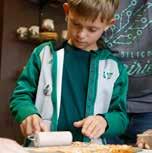

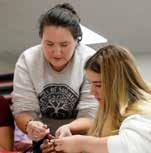
Sask Lotteries is an important fundraiser for more than 12,000 sport, culture and recreation groups in Saskatchewan. Backed by the strength of a volunteer network, these groups provide quality activities that reach more than 900 Saskatchewan communities, rural municipalities and First Nations, and benefit approximately 600,000 registered participants within every demographic of the province. Sask Lotteries is the marketing organization for Western Canada Lottery Corporation products, such as LOTTO 6/49, LOTTO MAX, EXTRA, DAILY GRAND and SCRATCH N’ WIN tickets, sold by retailers in Saskatchewan. Proceeds from the sale of these products are placed in the Sask Lotteries Trust Fund for Sport, Culture and Recreation.
Established in 1974, the Sask Lotteries Trust Fund for Sport, Culture and Recreation is a unique partnership of SaskCulture Inc., Sask Sport Inc. and Saskatchewan Parks and Recreation Association Inc.. These three non-profit organizations work in partnership with the provincial government under a multi-year agreement, which grants Sask Sport Inc. a licence to operate a major lottery corporation in the province and assures that the net proceeds go to support the development of sport, culture
and recreation throughout Saskatchewan. The Tri-Global partners (the Globals) share responsibility in the overall governance, policy direction and various joint programming initiatives, as well as managing their respective sections of the Sask Lotteries Trust Fund. SaskCulture manages the Culture Section of the Trust Fund (CST).
The Lottery Licence Agreement, signed by the global partners and the Government of Saskatchewan, sets the fee paid to government and outlines the strategic funding priorities of: engaging diverse populations and creating inclusive communities; increasing accessibility; contributing to quality programs and safe, welcoming and well-run facilities; supporting and promoting capacity and leadership; recognizing excellence and celebrating achievement; and encouraging individual well-being and healthy, active lifestyles.
SaskCulture is pleased to partner with Sask Sport, Saskatchewan Parks and Recreation Association and the Government of Saskatchewan to ensure that proceeds from Sask Lotteries support a wide range of sport, culture and recreation programs throughout the province.
Through its management of the Culture Section of the Trust (CST), SaskCulture supports a wide range of cultural activities, and diverse cultural organizations and groups throughout the province, in addition to its own operations. SaskCulture’s ten-member, volunteer Board of Directors has overall responsibility for the development of policy, and determining annual spending plan allocations for the CST. This work is done by the Board between January and March of each year, in accordance with the fiscal year of the Trust.
SaskCulture ensures that arms-length adjudication processes are used to support all funding decisions for the CST. Funding decisions are guided by the Sask Lotteries Trust Fund Agreement and SaskCulture’s Cultural Policy.
The overarching purpose of the Trust Fund is to effectively and efficiently allocate Trust Funds to achieve maximum benefits for the beneficiaries and the public. In achieving this, the Trust Fund is guided by the following principles and goals:
• Saskatchewan residents enjoy a quality of life through the provision of quality sport, culture and recreation programs and services that contribute to a healthy province;
• Sport, culture and recreation programs strengthen the cultural, economic and social viability of communities in Saskatchewan;
• The Trust Fund promotes inclusion, access, equity and fairness for all within the sport, culture and recreation sectors;
• Volunteer involvement and sector capacity are recognized as a cornerstone for sustainable sport, culture and recreation sectors; and
• The Globals will act in good faith, with honesty, and in the best interests of Saskatchewan residents and will be accountable for the sound management and responsible use of lottery proceeds.
In managing the Culture Section of the Trust, SaskCulture aims to deliver fair, equitable and accountable funding throughout the province. It relies on its own Cultural Policy to help guide volunteer peer assessment panels in making funding decisions. SaskCulture’s Cultural Policy places emphasis on:
• Cultural impact;
• Participation and access;
• Organizational effectiveness; and
• High standards of accountability.
SaskCulture relies on its beneficiary groups and volunteers to assist with actively promoting lottery ticket sales to preserve this lottery system.
The lottery system in Saskatchewan is unique and envied across Canada. For many decades, besides offering the chance to win prizes, Sask Lotteries has served as a successful fundraiser for sport, culture and recreation in the province. It continues to help ensure funds are available to deliver sustainable programs, services and events that provide opportunities for the people of Saskatchewan, and aids in building active, healthy, vibrant communities throughout the province.
Over the past five years, the Culture Section of the Trust distributed over $83.4 million dollars to support Saskatchewan cultural activities. In 2022/23, Sask Lotteries reached over $259 million in ticket sales, which provided approximately $24.1 million to the Culture Section of the Trust. The five-year Lottery Licence Agreement (20192024), signed in January 2019 with the Government of Saskatchewan, maintains the licence fee at 3.75 per cent of annual net lottery ticket sales. Another year of positive sales has contributed to the health of the Sask Lotteries Trust Fund, enabling the fundraiser to continue providing stable and consistent support to volunteer-led groups going forward.
In general, the gaming environment is volatile and competitive, and the proceeds generated for the Trust Fund are difficult to predict from year to year. While proceeds continued to grow this year, the Trust Fund bases its annual spending on future projected ticket sales, while maintaining a healthy reserve to protect against a decline in revenues. Even when ticket sales are strong, the Tri-Global partnership remains cautious and focused on ensuring stability of funding going forward.
In October 2022, government announced the formation of Lotteries and Gaming Saskatchewan (LGS) that will provide oversight for casinos, VLTs, lotteries and online gaming. While this new Crown Corporation will take over regulatory oversight of lotteries in Saskatchewan the province’s gaming and lottery operators, and all beneficiaries of net gaming and lottery income, will remain unchanged. Lotteries will continue to be operated by Sask Lotteries and the Western Canada Lottery Corporation, and continue to support sport, culture and recreation province-wide. Over the past year, the Ministry of Parks, Culture and Sport led discussions with the lottery partners on a renewed lottery licence agreement. It is expected that a new agreement will be signed in 2023.
It is important to remember, that the maintenance of lottery funding levels depends on the continued efforts of beneficiary groups to promote Sask Lotteries and encourage lottery ticket sales. Beneficiary groups also play an important role as advocates in support of the benefits of sport, culture and recreation for the people of the province. It is incumbent upon the lottery-supported cultural network to reach out with innovative ways to engage new participants, and support cultural activities at the local level. The continued support of volunteer organizations in Saskatchewan through the Lottery Licence Agreement is based on the recognition of the importance of sport, culture and recreation to community life.
The volunteer sector has been entrusted and empowered to develop and deliver a cost-efficient system of cultural activities at the grassroots level in communities throughout the province, and provide access to quality, inclusive activities that enhance lives and energize communities. This volunteer-driven system is one of the most successful lottery delivery networks in the country. The work of these volunteer groups also significantly impacts the provincial economy as Saskatchewan sport, culture and recreation activities generate billions of dollars in labour income and support thousands of full-time jobs.
For the fiscal period ending March 31, 2023
Lottery funding is an important part of the public resources used to support volunteer, non-profit organizations involved in delivering sport, culture and recreation programs and services to the citizens of Saskatchewan.
The majority of the funds from the Culture Section (approximately 50 per cent) are distributed to Eligible Cultural Organizations (ECOs) through SaskCulture’s Annual Global Funding (AGF) program. AGF program supports the annual operations of 30 provincial cultural organizations, which are designated as eligible by the Minister of Parks, Culture and Sport, as well as over 400 associated groups at provincial, regional and local levels through project and member funding programs delivered through the ECOs.
In 2022/23, the Sask Lotteries Trust Fund provided over $9 million to ECOs, with allocations recommended by a six-member volunteer peer assessment panel with diverse knowledge of the cultural community of Saskatchewan.
AGF is a multi-year operational grant that provides eligible organizations with a broad base of financial assistance, while allowing a high degree of freedom as to how funding is spent. The flexibility of this grant program has been instrumental in fostering the growth of many diverse cultural activities throughout the province. Besides supporting the continued stability of cultural programming in the province, the funding has also enabled many of these organizations to leverage additional grants and corporate funds to support cultural programming for Saskatchewan residents.
AGF supports a tremendous infrastructure that empowers a large portion of Saskatchewan’s volunteer-driven, cultural community. These diverse cultural organizations are rooted in community involvement and volunteer efforts. The ECOs are part of a network that bring together a membership of over 150,000 individuals who are actively supporting cultural activities throughout the province.
12% $2,258,797
15% $2,714,692
22% $4,009,962
50% $9,003,716
Eligible Organizations AGF Program Funds (SC Delivered) Program Funds (SK Arts Delivered) SaskCulture Block Tri-Partite Block (Culture’s Share)
1% $173,600
CULTURE SECTION ALLOCATIONS
The Aboriginal Arts and Culture Leadership (AACL) Grant supports the sharing of cultural skills and knowledge to young people through participatory cultural activity with First Nations or Métis arts and culture leaders. In 2022/23, AACL held two deadlines and 25 initiatives were supported.
The Métis Cultural Development Fund (MCDF), now offered in partnership with Gabriel Dumont Institute (GDI), supports community-based cultural activities and initiatives that preserve, strengthen and transmit Métis culture and traditions in Saskatchewan. In 2022/23, 23 Métis cultural groups were supported through this program.

The Multicultural Initiatives Fund (MIF) aims to advance cross-cultural understanding and supports work that aligns with the principles of Truth and Reconciliation in Saskatchewan. MIF supports organizations that encourage people to share, learn, appreciate and respect cultural diversity. This program offers both annual operational funding and project funding. In 2022/23, 41 project applications were approved, along with 12 applications for annual funding.
The Museum Grant Program (MGP) provides operational funding to help foster strong, vibrant, community-based Saskatchewan museums that are valued and supported by society. This funding enables museums to focus on excellence in their programs and operations and to contribute to the understanding of the world and our place in it – our past, our present, and our future. A total of 110 museums received operational funding from the Museum Grant Program in 2021/22. The Museum Grant Program deadline for applications is every two years. The last deadline was on December 1, 2021, and the next deadline will be in Fall 2023.
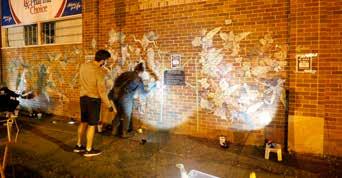
The Northern Youth Cultural Fund (NYCF), delivered in partnership with the Northern Sport, Culture and Recreation District (NSCRD), provides funding for cultural, artistic or creative interactive activities for children and youth ages 4 to 19 in northern Saskatchewan. In 2022/23, the fund supported 17 applications. NORTHERN
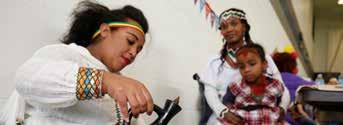
The Small Grant Accessibility Program (SGAP) aims to support grassroots, unique and innovative cultural initiatives, particularly those that respond to emergent needs or changes in the cultural sector, and create access for firsttime and under-served applicants. Three rounds of funding were offered in April 2022 (cultural project funding), October 2022 (digital technology capacity improvement funding) and February 2023 (cultural project funding). In 2022/23, the new program supported 26 applications.
SMALL GRANT ACCESSIBILITY PROGRAM (SGAP) – OCTOBER 2022
The Community Cultural Engagement and Planning Grant (CCEP) aims to support research, community engagement, cultural planning, community investment and development. Collaborative partnerships between cultural organizations and community sectors that promote cultural vitality and economic sustainability is another focus. CCEP is accessible by municipalities, First Nations, Tribal Councils, Métis Locals or Métis Regions in Saskatchewan to plan for the cultural life of a community. In 2022/23, six communities in Saskatchewan
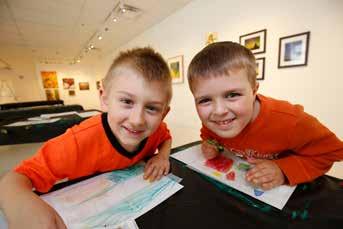
Creative Kids Canada Inc. is a charitable-giving program designed to help children and youth, whose families are facing financial barriers, participate in arts and culture programming. The program primarily relies on funding from sponsors, donors and fundraising initiatives. SaskCulture, through the Culture Section of the Trust, provides an annual grant to this program, as well as covering administrative costs so that 100 per cent of donations go directly to helping Saskatchewan children and youth.
Since 2010, Creative Kids has granted over $5.97 million, helping over 12,890 kids from 251 Saskatchewan communities. These numbers include kids supported by the DreamBrokers thanks to a special program fund organized through Creative Kids. In addition to helping kids, this program results in a huge investment to the cultural community, by supporting hundreds of cultural workers – including 546 music, dance, theatre, art and cultural instructors – as Creative Kids service providers. Visit creativekidssask.ca for more information.
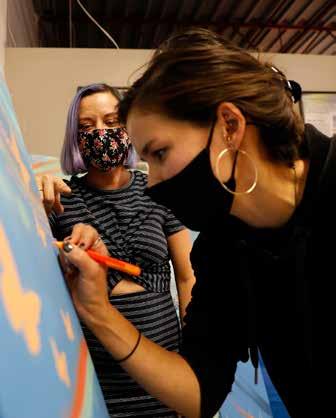
Artists in Schools programming provides schools opportunities to offer enhanced arts-related activities that are linked to defined curricular outcomes through partnerships with professional artists and arts organizations. The aim of the programs is to expand access to meaningful artistic activities, increase student engagement in learning, cultivate cross-disciplinary learning skills and attitudes and foster a life-long interest in the arts. In 2022/23, 16 partnerships were supported in the communities of Hepburn, Humboldt, Regina, Saskatoon, Sturgeon Lake, Swift Current, and Wynyard.
Funding also supports the LIVE (Live Interactive Video Education) program that engages teachers and students in all corners of Saskatchewan in an interactive distance learning experience where professional artists broadcast grade-specific programs in dance, drama, music and the visual arts through the Ministry of Education’s LIVE satellite Network; and the Ask Artists video series providing opportunities to build artistic skills in various disciplines, as well as address a variety of social topics such as racism, personal identity, embracing failure, and breaking stereotypes. During the 2022/23 school year, Lives Arts reached 9,751 students in a total of 89 communities.
liveartsaskatchewan.com
Artists in Communities programming provides communitybased applicants with opportunities to offer arts-related activities that are linked to local community objectives through partnerships with professional artists and arts organizations. The aim of the program is to contribute to the cultural life of a community and its engagement with the arts. In 2022/23, 27 applicants were supported in the communities of Asquith, Forget, La Ronge, Lloydminster, Lumsden, Melfort, Prince Albert, Regina, Saskatoon, Sturgeon Lake, and Weldon.
Resources from the CST are pooled with funding in SK Arts’ Professional Arts Organizations Program (PAOP) to provide 24 galleries with annual funding to support both their professional arts programs and services as well as governance, management, administrative and operational functions. Community-based galleries were supported in, Estevan, Moose Jaw, North Battleford, Prince Albert, Regina, Regina Beach, Saskatoon, Swift Current, Weyburn and Yorkton.

The SaskFestivals program provides support to professional festival organizations and presentation series across the province. The funding supports both artistic and administrative costs of a festival organization’s annual operations, as well as supporting artistic programs and/ or events that connect and engage professional artists and the community in a festival setting. In 2022/23, a total of 20 festival organizations were provided operational support and an additional 11 projects were funded. Successful communities included Air Ronge, Bengough, Big River, Forget, La Ronge, Manitou Beach, Moose Jaw, Paynton, Regina, Saskatoon, Swift Current, Vonda, Waskesiu Lake, Willow Bunch, and Yorkton.
The Media Arts Grant is also delivered by SK Arts under the auspices of the Professional Arts Organizations Program (PAOP), and provides operational support to non-profit, community-based film, video and new media organizations throughout the province. In 2022/23, a total of six media arts organizations were supported.
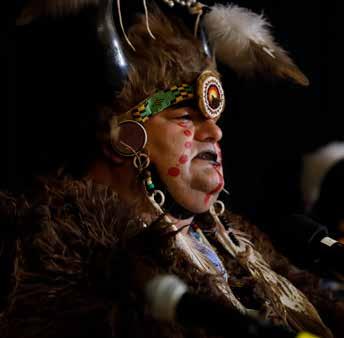
The Share and Connect: Indigenous Community Arts program supports Indigenous artists and communities through projects that contribute to arts and cultural revitalization. It emphasizes activity that increases the intergenerational transfer of Indigenous artistic knowledge and cultural practices within contemporary, traditional, and non-traditional art forms, as well as promoting Truth and Reconciliation in non-Indigenous communities through exposure to these projects and this work. Share and Connect provides different streams of funding support: planning; exhibitions; performances and presenting; mentorships; and artist and community partnership projects. In 2022/23, a total of 18 applications were funded. Successful communities were Balcarres, Big River, Cumberland House, La Loche, Muskoday First Nation, Paynton, and Webb.
SK Arts delivers the preceding six programs through a partnership agreement with SaskCulture. An operational grant is provided to SK Arts to assist with the costs associated with the adjudication, administration and overall program delivery of these funding programs. In addition, through this partnership, SK Arts provides administration services for the Saskatoon Creative Kids Committee.
For more information on these grants, visit www.sk-arts.ca
Photo by Kevin Hogarth (2022).SaskCulture receives an annual operating grant to support ongoing and new initiatives, as well as its own general operations. Creative Kids and Culture Days administration costs are covered within this area. In 2022/23, SaskCulture employed 19 full-time staff positions.
This fund gives SaskCulture the capacity to respond to opportunities and build partnerships that will benefit the cultural community as a whole. This past year, Global Functions supported the Chief Poundmaker Museum, as well as bonding and liability insurance premiums for 26 provincial cultural organizations on the Minister’s Eligibility List.
In order to contribute to an effective SaskCulture that is fully representative of, and informed by, the cultural community as a whole, SaskCulture contracts services or provides support through the appropriate mechanisms to engage its COIs including arts, heritage, multiculturalism, First Nations and Métis, and Cultural Industries. In 2022/23, these funds provided support to the Saskatchewan Arts Alliance, Heritage Saskatchewan, Gabriel Dumont Institute, and the Saskatchewan Indigenous Cultural Centre.
Operated by Sask Sport Inc., four Administration Centres for Sport, Culture and Recreation in Regina and Saskatoon, provide non-profit sport, culture and recreation organizations with comprehensive business services, such as a full-service print shop, postal service, web site development and maintenance, bookkeeping, payroll services, 51,000 square feet of office and storage space and multiple boardrooms with video conferencing services. The level of support paid from the Culture Section, based on usage of the centre by member organizations including SaskCulture, is 25 per cent.
The Community Grant Program assists in the development of sport, culture and recreation activities by providing lottery funding to nearly 1,000 communities through nonprofit community organizations operated by volunteers throughout Saskatchewan. CGP funding is available to all communities in Saskatchewan including 79 First Nations, 35 northern settlements, 296 rural municipalities, 147 towns, 291 villages, 145 hamlets, and 16 cities. This program enables communities to address the needs of their population and provide programs that are inclusive and increase participation for Indigenous peoples, newcomers, seniors, the economically disadvantaged, persons with disabilities, and single-parent families. This funding also supports 11 Dream Brokers working in Regina, Saskatoon, North Battleford, Prince Albert and Yorkton who provide approximately 1,200 culture programs and services, with funding allocation decisions made at the community level. The Culture Section of the Trust contributed 35 per cent of the approximately $7.5 million dollars allocated to the CGP this past year.
The CDF provides funding to seven Sport, Culture and Recreation Districts to facilitate community development through enhanced access to sport, culture and recreation programming throughout the province as well as 22 Northern Community School Recreation Coordinators. The Culture Section of the Trust contributes 30 per cent of the approximate $4.1 million dollar allocated annually to the Community Development Fund.